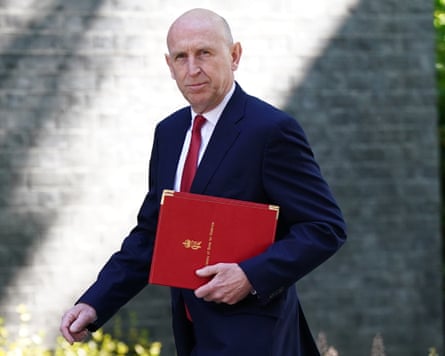Britain’s military will be increasingly powered by artificial intelligence, the defence secretary has said, as he prepares to announce a review with advanced technology at its core.
John Healey said he and his officials had put AI at the centre of the strategic defence review, as the government seeks to avoid the kinds of costly procurement mistakes that have plagued defence spending in the past.
Speaking to the Guardian during a trip to meet his European counterparts in Berlin and Rome, the defence secretary said: “In five years’ time, AI will have had a massive impact in the military and in the battlefield. We can see this already in Ukraine, just like in every other walk of life.
“We have to do a great deal more in defence to get on top and then get ahead and at the cutting edge of this. I want to put the UK military on the leading edge of innovation in Nato on AI.”
Healey will announce his review within the next three weeks, after nearly a year of work by the former defence secretary George Robertson and Gen Sir Richard Barrons, a former commander of the UK’s joint forces command.
Despite reports that big procurement decisions would be delayed until later in the year, after the publication of the review, Healey said it would set out concrete plans to better equip Britain’s armed forces. “We’re making procurement decisions now, and we’ll continue to do that,” he said. “This won’t be a damp squib.”
In February, the prime minister, Keir Starmer, announced a plan to increase defence spending to 2.5% of gross domestic product by 2027.
The British defence industry is also likely to receive a boost from additional cooperation with Europe, after this week’s UK-EU trade deal paved the way for UK companies to access the €150bn (£126bn) European defence fund.
Healey is likely to disappoint some in the defence community who were hoping for the review to promise billions of pounds for eye-catching systems such as a British “iron dome”, created by a new network of domestic surface-to-air missiles.
One source said such a plan would probably be an overly expensive way to protect the UK, compared with taking action to stymie potential threats abroad.

Healey said he wanted the Ministry of Defence to move away from making purchasing decisions that cost billions of pounds and take many years to complete, by which time the equipment in question is often out of date.
Earlier this year, for example, the army received its first delivery of Ajax tanks, 15 years after the decision was made to buy them and 8 years after the original delivery deadline.
Healey said the UK’s experience in Ukraine had underlined the importance of moving faster with procurement decisions and putting technology at the centre of them.
“We now see in Ukraine, on both sides, nearly 80% of the casualties caused by drones, not artillery,” he said. “For the first time ever, we see battlefield technology which has a life cycle measured in weeks, not months, let alone years.
“We have to get more tech in the hands of our frontline forces. And we have to be capable of upgrading and innovating at a wartime pace if we want to give our armed forces the edge over adversaries.”
One of the most important aspects of Healey’s technology-centred review will be expanding the use of AI. The British military is already trialling AI-enabled tools in countries such as Estonia, where the systems can automatically detect potential threats and select which weapon would be best to target them.
after newsletter promotion
The chancellor, Rachel Reeves, previously announced that the government would allocate 10% of the military’s equipment budget to spend on new technologies, including drones and AI. Healey told the Guardian he was now looking at creating a single pot of money to spend on AI, pulling together millions of pounds from across the department into one fund to spend on new systems.
The focus on AI is likely to increase business for companies such as Palantir, one of the world’s biggest suppliers of military technology.
Palantir has sold its automatic targeting systems to countries around the world, including to the Israeli army for use in Gaza. Earlier this year its executives gave Starmer a tour of their headquarters in Washington, and sources say the company is aiming to increase the amount of technology its sells to the British military.
Despite concerns about how Palantir uses data and the political leanings of its Trump-supporting founder, Peter Thiel, Healey gave a vigorous defence of the company.
“Palantir are playing a critical role in supporting Ukraine’s fight against Russia,” he said. “They have great innovations to help equip our armed forces when they work with us. And when they work for us, we set the standards.”
Sources also say that Healey’s insistence on deploying high-technology equipment more quickly would result in some kit being put into the field even if it is not 100% ready.
“Part of this is about getting equipment into the hands of troops and then making adaptations when we see what it can and cannot do,” one said.
AI has been so central to the defence review that it has even been used to help write it. Officials used an automatic reading tool to summarise and analyse more than 8,000 responses from outside organisations, comprising more than 2m words.

 4 hours ago
3
4 hours ago
3

















































